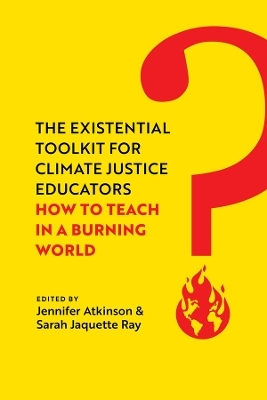
The Existential Toolkit for Climate Justice Educators
University of California Press (Verlag)
978-0-520-39711-8 (ISBN)
As feelings of eco-grief and climate anxiety grow, educators are grappling with how to help students learn about the violent systems causing climate change while simultaneously navigating the emotions this knowledge elicits. This book provides resources for developing emotional and existential tenacity in college classrooms so that students can stay engaged.
Featuring insights from scholars, educators, activists, artists, game designers, and others who are integrating emotional wisdom into climate justice education, this user-friendly guide offers a robust menu of interdisciplinary, plug-and-play teaching strategies, lesson plans, and activities to support student transformation and build resilience. The book also includes reflections from students who have taken classes that incorporate their emotions in the curricula. Galvanizing and practical, The Existential Toolkit for Climate Justice Educators will equip both educators and their students with tools for advancing climate justice.
Jennifer Atkinson is Associate Professor of Environmental Studies at the University of Washington, Bothell, and author of Gardenland: Nature, Fantasy, and Everyday Practice. Sarah Jaquette Ray is Professor of Environmental Studies at Cal Poly Humboldt and author of A Field Guide to Climate Anxiety: How to Keep Your Cool on a Warming Planet.
Acknowledgments and Gratitude
Introduction. Climate, Justice, and Emotions in the Classroom: Why a Toolkit?
Sarah Jaquette Ray and Jennifer Atkinson
PART I Getting Started with Emotions in the Climate Justice Classroom
1 A Pedagogy for Emotional Climate Justice
Blanche Verlie
2 Balancing Feelings and Action: Four Steps for Working with Climate-Related Emotions and Helping Each Student Find Their Calling
Andrew Bryant
3 Transformative Psychological Approaches to Climate Education
Leslie Davenport
4 From Existential Crisis to Action Planning: Building Individual and Community Resilience
Jessica D. Pratt
5 Empathy and Care: Activities for Feeling Climate Change
Sara Karn
6 The Emotional Impact Statement
Christie M. Manning
7 The Politics of Hope
Daniel Chiu Suarez, Sophie Chalfin-Jacobs, Hannah Gokaslan, Sidra Pierson, and Annaliese Terlesky
8 Unfucking the World
Leif Taranta
PART II Justice as Affective Pedagogy
9 Preparing Students to Navigate a Harrowing Educational Landscape: Accessibility and Inclusion for the Climate Justice Classroom
Ashley E. Reis
10 Photovoice for the Climate Justice Classroom: Inviting Students' Affective and Sociopolitical Engagement
Carlie D. Trott
11 Leveraging Affect for Climate Justice
Michelle Garvey
12 Infrastructure Affects: Registering Impressions of Mega-Dams
Richard Watts
13 From Principles to Praxis: Exploring the Roots and Ramifications of the Environmental Justice Movement
Shane D. Hall
PART III Embodied Pedagogies
14 Working with Ecological Emotions: Mind Map and Spectrum Line
Panu Pihkala
15 Building Somatic Awareness to Respond to Climate-Related Trauma
Emily (Em) Wright
16 Using Poetry to Resist Alienation in the Climate Change Classroom
Magdalena Mączyńska
17 Prompts for Feeling-Thinking-Doing: Somatic Speculation for Climate Justice
Sarah Kanouse
PART IV Futurity, Narrative, and the Imagination: Visualizing What We Desire
18 The Tool of Imagination
Doreen Stabinsky and Katrine Oesterby
19 Overcoming the Tragic
Peter Friederici
20 Practicing Speculative Futures
April Anson
21 Cultivating Radical Imagination through Storytelling
Summer Gray
PART V Unsettling Pedagogies: Discomfort and Difficult Knowledge
22 Critical Journalism, Creative Activism, and a Pedagogy of Discomfort
Kimberly Skye Richards
23 Why Worry? The Utility of Fear for Climate Justice
Jennifer Ladino
24 The Social Ecology of Responsibility: Navigating the Epistemic and Affective Dimensions of the Climate Crisis
Audrey Bryan
25 Beyond the Accountability Paradox: Climate Guilt and the Systemic Drivers of Climate Change
Marek Oziewicz
PART VI Joy and Resilience as Resistance
26 Joyful Climate Work: The Power of Play in a Time of Worry and Fear
Casey Meehan
27 Finding Hope in the Influence and Efficacy of Native/Indigenous Rights
Kate Reavey
28 Teaching Climate Change Resilience through Play
Jessica Creane
29 Building Capacity for Resilience in the Face of Environmental Shocks
Abosede Omowumi Babatunde
30 Releasing Growth
Terry Harpold
31 Ecotopia versus Zombie Apocalypse: Collaborative Writing Games for Existential Regeneration
Marna Hauk
PART VII Community, Collaboration, and Kinship
32 Facilitating “R&R”: Student-Led Climate Resilience and Resistance
Jessica Holmes
33 Climate Justice and Civic Engagement Across the Curriculum: Empowering Action and Fostering Well-Being
Sonya Remington Doucette and Heather U. Price
34 Come for Climate, Stay for Community: Acting, Emoting, and Staying Together through the Climate Crisis
Alissa Frame, Charlotte Graf, Lydia O’Connor, Jillian Scannell, Amy Seidl, and Emma Wardell
35 The Climate Imaginary: Reading Fiction to Make Sense of the Climate Crisis
Benjamin Bowman, Chloé Germaine, Pooja Kishinani, and Charlie Balchin
PART VIII These Skills Are Needed in the World: Career Planning for the Climate Generation
36 How Will Climate Change Affect My Career?
Debra J. Rosenthal, Jeffrey Johansen, and Ruth Jacob
37 Fostering Student Agency for Climate Justice through Vocational Exploration
Rachel F. Brummel
Appendix: Chapters Sorted by Themes
List of Contributors
Index
| Erscheinungsdatum | 14.05.2024 |
|---|---|
| Zusatzinfo | 12 b-w figures, 7 tables |
| Verlagsort | Berkerley |
| Sprache | englisch |
| Maße | 178 x 254 mm |
| Gewicht | 816 g |
| Themenwelt | Naturwissenschaften ► Biologie ► Ökologie / Naturschutz |
| Sozialwissenschaften ► Pädagogik | |
| ISBN-10 | 0-520-39711-8 / 0520397118 |
| ISBN-13 | 978-0-520-39711-8 / 9780520397118 |
| Zustand | Neuware |
| Haben Sie eine Frage zum Produkt? |
aus dem Bereich


